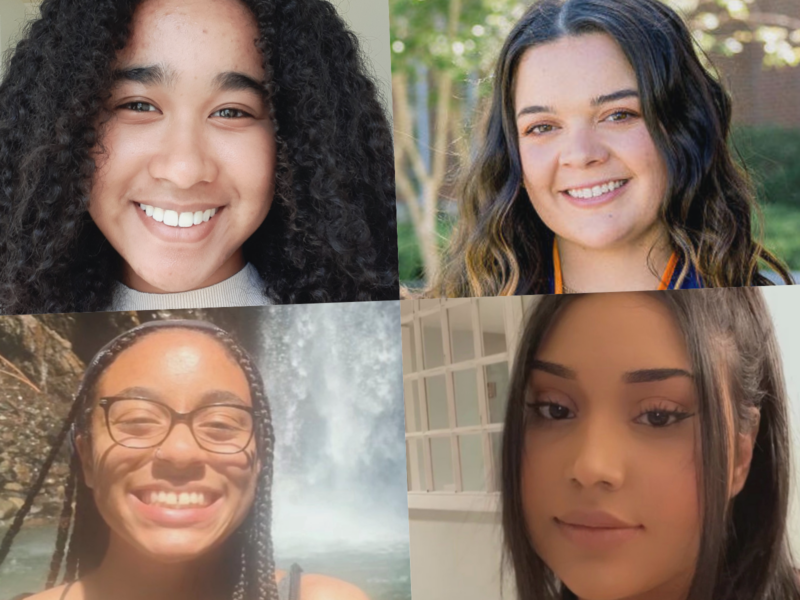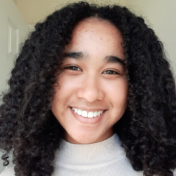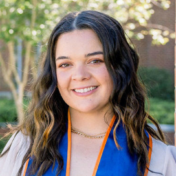Intern Spotlight: Grace L. Edwards, Jessica Girard, Lyric Harris, and Antara Saha

The Center for Health Economics of Treatment Interventions for Substance Use Disorder, HCV, and HIV (CHERISH) is delighted to welcome four astounding interns this summer: Grace L. Edwards, Jessica Girard, Lyric Harris, and Antara Saha.
Setting personal goals to pursue medical journalism, forensic psychiatry, nursing, and a doctoral degree in developmental psychopathology, they applied through the National Institute on Drug Abuse (NIDA) Summer Research Internship Program and the Summer Undergraduate Minority Research (SUMR) Program at the University of Pennsylvania to participate in and become acquainted with academic research.
The interns matched with CHERISH investigators to gain new perspectives on how health policy, health economics, and substance use research come together to inform interventions that can have a positive impact on populations affected by substance use. The investigators include Dissemination & Policy Core Director Zachary Meisel and Co-director Margaret Lowenstein, Methodology Core Co-director Sean M. Murphy, CHERISH Director Bruce Schackman, and CHERISH Research Affiliate Angélica Meinhofer.
Read on to learn more about their ambitions and the time they have spent with the investigators.

Grace L. Edwards
Degree program: Bachelor of Arts in Health & Societies; Minor in Journalistic Writing.
Most skillful at: Singing for fun (but is also classically trained on the violin)
Tell us about yourself!
I am an incoming second-year student at the University of Pennsylvania. I am pursuing a bachelor’s degree in health & societies, minoring in journalistic writing, and have the intention to attend medical school. Based on my previous encounters with educational and health inequities, I hope to improve healthcare services through the use of medical journalism, patient narratives, and participatory medical research. In addition, I hope to educate communities of color on health practices through journalistic writing, medical research, and the practice of medicine.
What led you to intern with SUMR at Penn LDI?
What attracted me to the SUMR program was the wealth of opportunity to develop my research skills in projects that were meaningful and personal to me and within a safe space of like-minded scholars who looked like me. I chose to match with my mentors, Dr. Zachary Meisel and Dr. Jaya Aysola, because of their pursuit of projects that examined equity in healthcare spaces, either in dissemination and translation of health matters or in academia– I am passionate about both of these areas.
Where do you see this experience taking you academically, professionally, or personally?
Professionally, I see this experience as part of the foundation that will enable me to pursue a personalized career path that includes both medical service and health services research. As a result, I will pursue medical school and subsequent master’s programs that will aid in my knowledge in the areas of public health and health policy research. Ultimately, I want to serve my community and improve healthcare access and education.
What can you tell us about the project(s) you are working on with your principal investigator?
During my time with Dr. Meisel and Dr. Maggie Lowenstein at CHERISH, I am exploring a number of projects relative to substance use disorder, health communications, and health policy. Currently, I am aiding in the creation of educational modules for research trainees and a community advisory board and analyzing patient testimonies to examine the impact of neighborhood blight and substance use disorders on several different communities in Philadelphia.

Jessica Girard
Also known as: Jess
Degree program: Bachelor of Science in Cognitive and Behavioral Neuroscience; Minor in Chemistry.
Most skillful at: Collegiate horseback riding
Tell us about yourself!
I was born and raised in South Florida and graduated this past May from the University of Florida (UF). I knew I wanted to pursue neuroscience during my junior year of high school when I was taking advanced placement courses in chemistry and psychology. At UF, I realized I was also very interested in the criminal justice field and spent a year interning at the Office of the Public Defender in Gainesville. That experience solidified my passion for advocating for criminally-involved individuals with psychiatric disorders.
What led you to intern with NIDA?
While studying at the UF, I took a class called, “Neurobiology of Substance Abuse,” which I loved. The NIDA internship was the perfect opportunity to combine my academic interest in drug addiction research with my passion for advocacy. The ineffective policy imposed on the vulnerable clients at the public defender’s office was extremely frustrating to witness and left me questioning how long-term treatment could be effectively delivered to these clients. I chose to match with Dr. Sean Murphy because I knew an understanding of health policy and economics was crucial to actualizing my end goal of developing treatments for criminally-involved individuals with psychiatric disorders.
Where do you see this experience taking you academically, professionally, or personally?
My overall career goal is to become a forensic psychiatrist, so I am currently working on gaining experience in research and patient care settings to build my resume and make sure medical school is the right step for me. I had no research experience prior to this internship, so I was not certain how much I would enjoy working in a lab. Thankfully, I loved learning about the academic research process over the last few weeks, so I am looking for open research assistant positions back in Gainesville, FL, and plan on applying to the NIH Post-Baccalaureate program this fall.
What can you tell us about the project(s) you are working on with your principal investigator?
I am currently working with Danielle Ryan to update the paper, “The Cost of Crime to Society: New Crime-Specific Estimates for Policy and Program Evaluation,” published by Dr. Kathryn McCollister and colleagues in 2010 with new data from 2009-2019. The paper estimates the tangible and intangible costs of different types of crime to society so policymakers can better evaluate the effectiveness of social programs. My main responsibility is to write a literature review for the updated paper but I also help Danielle with data collection as needed.

Lyric Harris
Degree program: Bachelor of Science in Healthcare Management and Policy
Most skillful at: Building Legos (especially with Marvel sets)
Tell us about yourself!
I am a rising senior at Georgetown University. I hope to become a family nurse practitioner and work primarily with homeless individuals and families. Outside of academics, I run track at Georgetown University and enjoy tutoring youth within D.C.’s public school system. I also enjoy reading comic books (Marvel not DC) and walking my dog, Janet Jackson.
What led you to intern with NIDA?
I wanted to gain more experience in research surrounding substance use and addiction medicine. One of my main goals has been to practice medicine within groups that I see myself and my community reflected in. One group that I have a personal connection with is individuals who are homeless. After shadowing at clinics within the community I grew up in, I realized that it is nearly impossible to work with homeless individuals at a clinical level without knowledge on issues of substance use. I matched with Dr. Bruce Schackman so I can learn more about issues surrounding effective care for those who use substances.
Where do you see this experience taking you academically, professionally, or personally?
This internship has taught me a lot about how providing care for individuals who use substances takes a multifaceted approach and requires careful consideration of factors that affect an individual and how they engage with treatment. The work I have done so far also trained me to look at barriers to care through a lens that examines the structural factors and the challenges they pose to individuals and groups receiving care. I find these experiences helpful in guiding how I approach becoming a family nurse practitioner and finding the right treatment for patients.
What can you tell us about the project(s) you are working on with your principal investigator?
I just finished working with Dr. Schackman on a presentation for the National Academy of Medicine’s Opioid Collaborative. In the presentation, we examined three social determinants of health, such as food, housing, and transportation, and the barriers to implementing strategies that address these determinants in the overdose crisis. Now, I am working on a presentation on contingency management that will frame this strategy from a reimbursement perspective.

Antara Saha
Also known as: Tara
Degree program: Bachelor of Science in Psychology; Concentrations in Biology and Chemistry
Most skillful at: Reading, writing, and speaking in Spanish, French, Hindi, Urdu, Bengali, and Punjabi.
Tell us about yourself!
I am a rising senior at Stony Brook University, pursuing a Bachelor of Science in psychology with biology and chemistry concentrations. I am also a research assistant for the Developmental Stress and Prevention Lab under Dr. Kristin Bernard at Stony Brook. This summer, I am working with Dr. Angélica Meinhofer at Weill Cornell Medicine as part of The National Institute on Drug Abuse Summer Research Internship Program. I enjoy traveling and getting away for weekends, watching police-procedural and thriller movies, and shopping. My long-term ambition is to achieve a PhD in developmental psychopathology and work with children and families.
What led you to intern with NIDA?
I was drawn to Dr. Meinhofer’s dedication to working with underrepresented populations, as I knew that her background in economics and health care would provide me a different perspective than my current studies at Stony Brook University. I also liked that Dr. Meinhofer’s experience with secondary data analysis was something unfamiliar to me; primary data collection is more popular in a standard clinical setting in psychology. I expected her involvement in various ongoing projects would also expand my skills and help me discipline my work ethic to align more efficiently with a faster-paced work environment.
Where do you see this experience taking you academically, professionally, or personally?
I am very grateful to have experienced a different side of academia so early on in my professional career. As I work through this internship, I have come to realize my interest in conducting research on a national level and making an impact on health care policy. Personally, I am very glad I was paired with Dr. Meinhofer who is so dedicated to her work. After being exposed to various facets of the work we do, I have a better understanding of how certain fields like clinical psychology and health care policy overlap and differ.
What can you tell us about the project(s) you are working on with your principal investigator?
My professional relationship with Dr. Meinhofer involves more of a skill-based training approach rather than working on one long-term project. Her work involves many offsite collaborations and presentations that I regularly help her complete. Whether I am filing data request forms, working on manuscripts or presentations for conferences, converting ICD codes, performing literature searches, or getting acquainted with Endnote or Stata, I am constantly being exposed to real-life skills used in research that I appreciate very much. No two workdays are ever the same and I find myself being proud of my newfound skills utilized through a lot of the work assigned on a weekly basis.